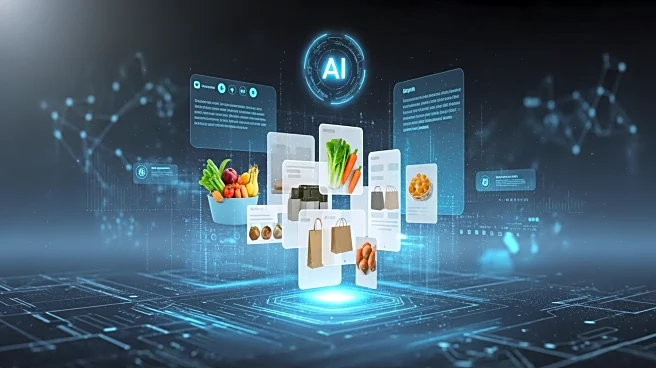What's Happening?
Instacart has unveiled a suite of AI solutions aimed at revolutionizing grocery retailing. The centerpiece of this initiative is the Cart Assistant, a personalized AI-powered shopping helper designed to
support meal planning and nutrition. This tool learns from individual customer preferences and purchase history, offering a tailored shopping experience. Kroger plans to integrate Cart Assistant into its iOS app, while Sprouts Farmers Market will implement it across its website and app. Instacart's technology also includes business intelligence tools that analyze agentic AI activity, providing insights into consumer interactions. Additionally, Instacart has introduced Store View, an inventory intelligence solution that offers real-time insights into product availability using advanced computer vision models.
Why It's Important?
The introduction of AI-driven solutions by Instacart marks a significant shift in the grocery retail industry, emphasizing the growing importance of personalized shopping experiences. By leveraging AI, retailers like Kroger and Sprouts Farmers Market can enhance customer satisfaction and streamline operations. The ability to analyze consumer behavior and inventory in real-time allows for more efficient stock management and marketing strategies. This development is poised to benefit both retailers and consumers, offering a competitive edge in a rapidly evolving market. As AI continues to transform retail, businesses that adopt these technologies may see improved customer loyalty and operational efficiency.
What's Next?
Instacart's AI solutions are set to expand further, with Store View launching soon at McKeever's and other retailers. As more companies integrate these technologies, the retail landscape is likely to see increased competition in offering personalized shopping experiences. Retailers may need to invest in AI capabilities to keep pace with industry leaders like Kroger. The success of these initiatives could prompt other sectors to explore similar AI-driven solutions, potentially leading to broader applications across various industries.
Beyond the Headlines
The deployment of AI in grocery retailing raises questions about data privacy and the ethical use of consumer information. As AI systems become more integrated into shopping experiences, retailers must ensure that customer data is handled responsibly. Additionally, the shift towards AI-driven retailing may impact employment, as automation could reduce the need for certain roles. These considerations highlight the need for balanced approaches that prioritize both technological advancement and ethical standards.










